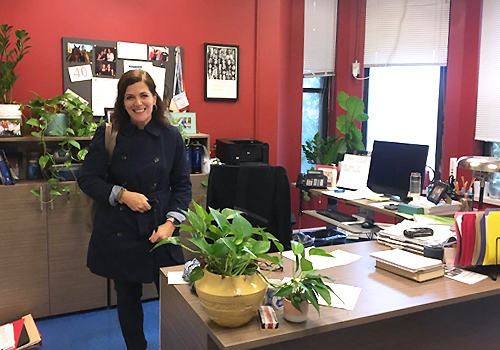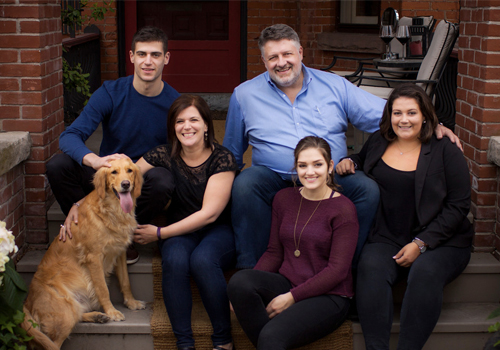Faculty of Arts & Science undergraduate courses sparked a passion for social justice that has guided Lisa Cirillo’s legal career for more than 20 years.
Inspired by discussions around how the legal system could truly deliver justice, Cirillo volunteered at the John Howard Society of Ontario as a student, guiding young offenders through life skills lessons.
“Even as an undergrad here at U of T, I could see very clearly that the people who were being policed, charged, convicted and incarcerated were disproportionately people of colour, and that the institutions were filled with racialized individuals, including a disproportionate number of Indigenous people,” says Cirillo, who earned her honours bachelor of arts with an English specialty and criminology major in 1993 as a member of St. Michael’s College.
“That understanding — through those inquiries and the intersection of those ideas — sparked my desire to go to law school.”

Her commitment to social justice is a common thread throughout her career. After earning her bachelor of laws degree from Queen’s University in 1996, Cirillo worked at a number of legal clinics before managing the Family Law Education for Women project, assisting marginalized women in understanding their rights and responsibilities under family law. She also worked with Community Legal Education Ontario on the “Your Rights. Your Language.” project, helping newcomers to Canada understand their legal rights.
She earned her master of laws degree from Osgoode Hall Law School in 2010 and spent the next 10 years with Downtown Legal Services, a community-based legal clinic at U of T’s Faculty of Law There, she helped more than 1,500 clients a year and worked with about 120 U of T students a year.
As of September, Cirillo is continuing her social justice mission as the CEO of the Law Foundation of Ontario (LFO), joining the organization at a crucial time. Before the pandemic hit, she explains, Downtown Legal Services and other similar agencies were already working at full capacity, the demand for services vastly exceeding their capacity. They were all relying on the support of the LFO, which provides millions of dollars in grants each year to agencies working to improve access to justice across the province.
Just one month into the pandemic, it was crystal clear — and this is true internationally — that COVID-19 is disproportionately impacting low-income, vulnerable communities.
For many vulnerable communities, services are scarce. While anti-Black racism and social injustice south of the border has received plenty of attention, she stresses it’s a significant concern in Canada too. She points to an August 10 Ontario Human Rights Commission report that confirms Black people are disproportionately arrested, charged and subjected to use of force by Toronto police.

“What the Human Rights Commission found was shocking, and it really challenges us to, yes, observe what's going on in the States, but not to feel in any way that we don’t have the same problems here,” she says.
And then the pandemic hit, greatly increasing the need for services.
“Just one month into the pandemic, it was crystal clear — and this is true internationally — that COVID-19 is disproportionately impacting low-income, vulnerable communities,” she says.
“Those demands for services are only going to increase. There'll be waves of impact from COVID-19 and that’s not even counting a second wave of the pandemic. What happens six months down the road when jobs still don't exist, people have run out of services, they can't pay their rent and the moratorium on eviction proceedings has just been lifted? People will be plunged into homelessness. The situation for vulnerable communities has gotten a lot worse with COVID-19.”
Cirillo brings considerable experience to her role with the foundation, having practiced human rights, education, housing and family law in a wide variety of social justice organizations, including ARCH Disability Law Centre and the Ontario Human Rights Commission.
“Lisa brings such well-rounded experience in social justice, poverty law and legal education grounded in an understanding of community need,” says Linda Rothstein, the foundation’s board chair.
Cirillo’s role at LFO starts with considerable homework. After years of pleading agencies for funding, she now finds herself on the other side of the fence, committed to learning the intricacies of foundation work. Building relationships — during a pandemic and when building new relationships is complicated — will also be first priority.
Ultimately, she brings with her a continued focus on improving access to justice for vulnerable Ontarians.
“I’ve been so grateful to always be able to do work I believe in, and to work with amazing people in every workplace that I've been at who feel the same. That's remarkable,” she says. “Now at the foundation, I look forward to being able to support agencies in their efforts to support vulnerable communities that critically need us.”
A commitment to social justice isn’t the only lasting impact from her days at U of T.
“I think the most valuable part of my undergraduate education at U of T was the high volume of research and writing I had to do and how critical those skills have been in every single role I've taken,” she says. “These skills — the ability to research, analyze and write clearly and persuasively — are critical skills in law.”

